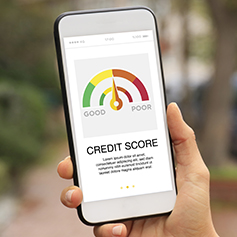

The COVID-19 pandemic has wreaked havoc around the world and left many business owners struggling. According to the National Federation of Independent Business (NFIB), 92% of small businesses said they had suffered negative effects as a result of the pandemic. The business landscape has changed, and credit is more important than ever to pave the road to recovery.
Many companies are adapting their business models to maintain or rebuild essential credit worthiness in this tough marketplace. If you’re worried about what will happen to your credit report, you may benefit by using resources such as the Small Business Administration (SBA) SCORE. SCORE offers access to mentors for guidance as you look to rebuild or reposition your business. Mentoring services and webinars focused on the pandemic challenges are available and often free of charge.
Recovery requires difficult decisions and there’s no one size fits all solution to overcome the unprecedented challenges we’re facing. Develop a plan to rebuild and/or protect your credit - the following steps provide some ideas and guidance that may assist you in your efforts.
There are various items to consider but start with the numbers. Having a current profit and loss statement, cash flow information, and balance sheet are part of the essential first step. This means you’ll need an updated set of financial statements to compare to prior years to determine the impact of the pandemic on your business’s profitability. Closely examine March 2019 through August 2019 compared to the same period in 2020 to gain valuable insight. Some business owners say they've benefited from the pandemic, so it's possible that there may be some positive data or a less severe impact once you take a deep dive into the numbers.

Aside from sales revenue, profits, and cash flow, you should consider intangible aspects such as employee layoffs. Reduced advertising and marketing budgets and the potential that customers may have migrated towards the competition should also be accounted for in your financial assessment. Additionally, the outlook for small businesses varies by industry, so it's critical to understand what recovery may require and the expected timing specific to your industry since many small businesses came into the COVID-19 crisis with low financial resilience.
Having a list of debts will help clarify obligations and current financials. Make a list of the lender amounts and terms to gain a detailed understanding of your financial health. Gain insight through research and financial experts where possible. Consult with a CPA if it’s financially feasible.
One of the most important steps that may quickly improve and protect your credit is direct communication. A personal phone call or email could be very beneficial to learn what assistance may be available. With a strained economy and evolving marketplace, there are additional options to explore. Communicate with lenders and understand your options now rather than later.
The Coronavirus Aid, Relief, and Economic Security (CARES) Act has forbearance and credit reporting requirements that may be suited to your situation and be an invaluable resource.
Under the CARES Act, certain situations require lenders to report your accounts as current. If you have a federally backed mortgage, you can ask for a forbearance. This can be a tremendous resource for maintaining personal credit and help to offset unordinary business expenses.
Evaluate and compare debt relief options. These "relief programs" may allow you to enter into agreements such as the following:
If there is not a financial assistance option available to suit your business needs, pay what you can towards your debt. If you can make the minimum payment on your lines of credit, it will avoid late fees and negative credit reporting, which will help preserve your credit score.
Account performance and payment history are usually reported to consumer reporting companies and credit bureaus, so if you’re struggling to pay bills, make sure it’s documented where possible. Consider adding a statement to your credit report that briefly explains the situation and your recovery plan. Equifax allows a 100-word statement enabling you to document that missed payments or other issues on your credit report are COVID-19 related. When seeking new sources of capital, creditors will be able to see this and potentially factor it into their decision, which may improve the chances that a decrease in your score will be less detrimental moving forward. You can add statements to Experian and TransUnion credit reports as well.

Stay current with your credit-related activities by reviewing your full credit report frequently. Consider utilizing credit monitoring services offered by Equifax and others. Quickly address and dispute any incorrect information to mitigate risk from the ongoing financial uncertainty. You can get a free copy of your credit report once a year by going to annualcreditreport.com, but it’s best to monitor credit more frequently during these uncertain times.
Unless your business did exceptionally well and has maintained positive cash flow during the pandemic, you’re likely going to need additional capital to rebuild, and this is directly correlated with your credit rating. A study from the Federal Reserve Bank of New York showed that only one-in-five healthy small businesses had enough cash reserves to maintain normal operations while experiencing a two-month revenue loss. You may need working capital funding to protect your credit and maintain operations.
When reaching out to a lender, disclose your business and personal FICO scores upfront. Make sure to have documentation supporting pandemic impacts to your credit. Most importantly, portray a clear path to recovery. This should include cash flow projections, financials with profit and loss scenarios, and a current balance sheet. Be prepared to discuss and document changes made and relevant forward-looking plans for success based on different scenarios. Emphasize that you will maintain a competitive advantage compared to others in similar situations. Clearly illustrate a vision to rebuild or maintain your credit and business. Providing projections and well thought out strategies will set you apart from the competition.
1Since each business situation is unique, businesses should research resources and financing options to determine what solutions are best for their organization. Discuss options with your accountant or business advisor.
---
Ascentium Capital is committed to supporting businesses nationwide and has continued to lend during the COVID 19 pandemic. If your business needs equipment, technology or a working capital loan, contact us today to learn how much you may qualify for. Financing based on credit approval.
To get started, simply fill out this quick form and a finance manager will contact you to discuss your business financing needs.
